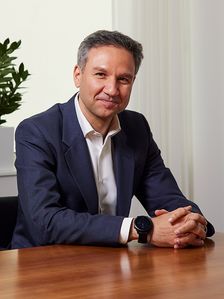Digital transformation has accelerated at an unprecedented rate during the pandemic, compounding long-term tech trends, say Permira principal Andrew Young and partner Michail Zekkos
Q: What impact has covid-19 had on the pace of digital transformation?
Michail Zekkos: Covid-19 has acted as an accelerator for structural themes that our Tech team has been investing behind for years. That acceleration in response to lockdown restrictions has been profound, allowing us to work and educate our children remotely, keep us connected, consume digital media and buy products online. We have been operating using digital infrastructure like never before.
In April, Microsoft CEO Satya NaDella was quoted saying he was seeing two years of digital transformation in two months across remote teamwork, remote learning, sales and customer service, critical cloud infrastructure and cybersecurity. At Permira, we have seen how this transformation is playing out in each of these six verticals. Our portfolio includes TeamViewer in remote working; Curriculum Associates in remote learning; Allegro and Seismic in remote sales; Genesys in remote customer service; Teraco and Informatica in cloud infrastructure; Exclusive Group in cybersecurity; and our most recent investment in Clearwater enabling cloud reporting for financial services clients.
Those businesses are continuing to see strong growth as customers adjust their operations, supply chains and go-to-market strategies in light of this new, remote environment.
Q: Has the pandemic accelerated the disruption of any sectors in particular?
Michail Zekkos: I don’t think there is any sector that will remain unaffected. It is a question of speed of travel, not of destination. However, the physical restrictions brought about by covid-19 have accelerated the transition from bricks and mortar retail to e-commerce in a disproportionate way as we have experienced through our investments in Allegro and Klarna. In certain e-commerce segments, we are experiencing three years of penetration growth in a single year.
There will be a return to a more physical world, but our view is that efficiencies consumers and enterprises have experienced mean new ways of operating will become the norm. We may not have another year of three years of penetration growth, but I don’t think penetration will revert to pre-covid-19 levels.
Q: How has cloud adoption been affected?
Andrew Young: When you think of all those employees working from home, trying to operate with inflexible software, that simply will not be allowed to happen again. There was already real momentum building behind transition to the cloud, and covid-19 has only intensified that.
I spend a lot of time with financial services institutions, for example, which were, once upon a time, concerned about the security of the cloud. That narrative has now played out. There are very few CTOs looking to put on-premise software in place. The public cloud is fundamental to our investment thesis and we are leaning into situations where we see great products delivered over future-proofed technology. That is fundamental to our investments in both Seismic and Clearwater.
Q: How difficult is it to execute deals in the current environment and how have you had to adapt to that?
Andrew Young: The way we operate at Permira has not changed materially. We have always worked across multiple geographies. We believe proximity matters and we have 14 offices around the globe, which means you can still have that socially distanced walk or coffee. The lack of travel has also freed people up to be more focused on key themes. Travel has been something we have been thinking about carefully in any case, in terms of its impact on the environment.
Of course, we have not been able to spend the same time with prospective management teams in an intimate setting that we normally would. Nonetheless, we have announced four technology investments during the pandemic (Seismic, Zwift, Mirakl and Clearwater), spending many hours on Zoom, which is a great tool for collaboration and provides an extremely focused way of working. From a communication perspective, there have been some positives.
Q: Private equity is a people business, but given that some relationship dynamics have become challenged, do you think we will see a more data-led approach?
Andrew Young: The human side will always be important. Every transaction we have been involved in this year has centred on what we would call “relationship equity”. There is so much choice for management teams and owners in terms of capital, that treating people well and forging genuine partnerships with management is critical.
With covid-19, it has become more difficult to form views on individuals through human contact, but that has just meant there has been a huge amount of referencing going on in both directions. Increasingly we find price not being the main determinant, rather partnership to help businesses grow; such as Clearwater where we bring European connectivity through 35 years of experience and eight physical offices. At the same time, at Permira, we have always been data-driven. We have always done a deep dive – that is just part of how we operate. We find it far less taxing on management teams to ask them to package all their data up in a data cube and then leave it to us to dig in for data-driven insights.
Michail Zekkos: It is not an either/or scenario. You need those relationships, but you also need the data, and not just the data that comes from the company. We are using more unstructured data than ever before. Permira has built a team of talented data engineers and scientists focused on just that kind of analytics, which enables us to get insights faster during the acquisition process and to unlock potential during the value creation stage. That analysis helps us identify new data-driven use cases and to extract value from existing data that resides within the company.
We are seeing more of that data analysis than a decade ago, but that does not take anything away from the importance of people and relationships. Indeed, I would argue it makes those elements even more important because you need to decipher and bring insight to the mountains of data you have access to.
Q: How would you describe the exit environment for tech businesses?
Michail Zekkos: If you had told me at the end of last year that we would be going through a global pandemic that would lead to higher corporate, personal and government debt, as well as lower spending, and yet public markets would be at nearly an all-time high, that is probably not a proposition I would have subscribed to. And yet, because of the weight of money looking for a home, here we are.
If you look one layer deeper, however, it is clear that the market is bifurcating between the “haves and have nots”. Businesses that offer structural growth and unit economic profitability enjoy highly supportive exit markets. Businesses that are expected to come out of covid-19 structurally impaired face nearly shut markets. In large part, we have benefited from investing behind long-term themes and so have found our portfolio, almost entirely, in the former camp.
Q: Which tech trends will be most transformative in the years to come?
Michail Zekkos: Cloud adoption and software-as-a-service are trends that have been compounding for over a decade and which have now reached a tipping point. More and more companies are adopting a cloud-first approach to drive digitisation. This transition will have profound implications for all sectors and verticals and will also drive new disruptive businesses that can scale up more quickly and efficiently to compete. Prior to covid-19, 25 percent of all workloads were in the public cloud. It took almost a decade to reach that point, and yet penetration has risen to 30 percent in a single year and that trend is poised to continue. That makes this a very exciting space and one our entire team continues to focus on.
“Our strategy has been reinforced by covid-19 rather than shaped by it,” says Michail Zekkos.
“We have always invested behind businesses with excellent products, strong unit economics and on what, we think, is the right side of long-term disruptive trends. Today, those businesses are delivering hard to find compounding growth and even harder to find resilience. Seismic is a prime example.”
Seismic is a business that Permira was tracking pre-covid. It is a sales enablement software company, operating in the public cloud, that helps take sales from an art towards a science. It is all about getting the right material into the hands of salespeople for the right opportunities.
“If you are about to pitch a Midwest bank, the software will provide you with the materials that are statistically most effective in that scenario,” says Andrew Young. “That business has experienced a huge uptick during covid-19 as remote selling has become the norm.”
Permira’s conviction to invest, meanwhile, was based on the experience of other portfolio companies that were already customers. “They pointed out that this software had been a real gamechanger,” Young explains.
The deal was originally slated to be a minority investment, made from Permira’s dedicated minority fund, but eventually ended up as a majority deal. “That flexibility of capital is really important,” Young adds. “With the weight of capital out there in the market, you need to be able to offer that choice.”
Permira plans to support Seismic’s growth in Europe, where it has eight offices across the continent. “That will prove important for this company,” says Young. “We can also help operationally, giving the business the confidence to go after this burgeoning market where there is a landgrab going on at the moment.”
Young adds: “We are backing an excellent team in a business that is doing amazingly well as the notion of selling remotely gains traction. I don’t think anyone misses being at the airport every other day when, with the support of companies like Seismic, they can be just as effective remotely.”









